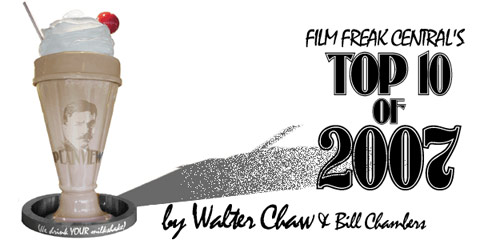
Well the road is out before me
and the moon is shining bright
what I want you to remember
as I disappear tonight
today is grey skies
tomorrow is tears
you'll have to wait 'til yesterday is here.
-Tom Waits, "Yesterday Is Here"
Break it down: 2007 resets the early days of the New American Cinema–the last years of the Apollo space program (and sure enough, we have a documentary about the remaining Apollo astronauts in David Sington's In the Shadow of the Moon) and Watergate, the death twitches of the 1960s gradually revealing themselves in pictures. Whether this leads to another Golden Age or merely another stutter-step on the road of our grief remains to be seen, but past the halfway point of the first decade of the new millennium (and six years after 9/11 hit its own reset button), the 2000s have already established themselves with the usual single-minded purpose. At the least, celebrate the resurgence of American cinema–the mainstream re-establishing itself as not just a dream factory, but a garden of auteur delights as well. 2007, above anything else, heralds a banner year for the auteur theory (Paul Thomas Anderson, Apichatpong Weerasethakul, the Coens, Tarantino, Sean Penn, Cronenberg, Brad Bird, Kim Ki-duk, David Fincher, Ken Loach, Ang Lee, Brian DePalma–and flicks I didn't catch by guys like Paul Schrader, Francis Ford Coppola, Tsai Ming-liang, John Sayles, and so on), with the films, like Sweeney's razors, functioning as extensions of the directors' biological selves.


 2011 was a turning point for me. Two films–Red Cliff and The Tree of Life–did it, the one returning to me a measure of my identity, the other giving me a sense that I’d avoided asking ultimate questions about my relationship with film from the start. My stances that there are right and wrong answers in the liberal arts and that people are only entitled to an educated opinion held steady–but I’d never asked why it was that the things I liked were the things I liked. Around this time, I read Jonathan Lethem’s monograph on John Carpenter’s They Live and was consequently inspired to write one of my own, on Steve De Jarnatt’s Miracle Mile. I chose that movie not because–perhaps I should say, not only because–of its relative obscurity, but because it was a movie I’ve been evangelical about since first seeing it in 1989. The process of writing that monograph consumed much of the last half of 2011. I skipped screenings because of it, and found myself incapable of reviewing the films I did see very well, if at all.
2011 was a turning point for me. Two films–Red Cliff and The Tree of Life–did it, the one returning to me a measure of my identity, the other giving me a sense that I’d avoided asking ultimate questions about my relationship with film from the start. My stances that there are right and wrong answers in the liberal arts and that people are only entitled to an educated opinion held steady–but I’d never asked why it was that the things I liked were the things I liked. Around this time, I read Jonathan Lethem’s monograph on John Carpenter’s They Live and was consequently inspired to write one of my own, on Steve De Jarnatt’s Miracle Mile. I chose that movie not because–perhaps I should say, not only because–of its relative obscurity, but because it was a movie I’ve been evangelical about since first seeing it in 1989. The process of writing that monograph consumed much of the last half of 2011. I skipped screenings because of it, and found myself incapable of reviewing the films I did see very well, if at all.



